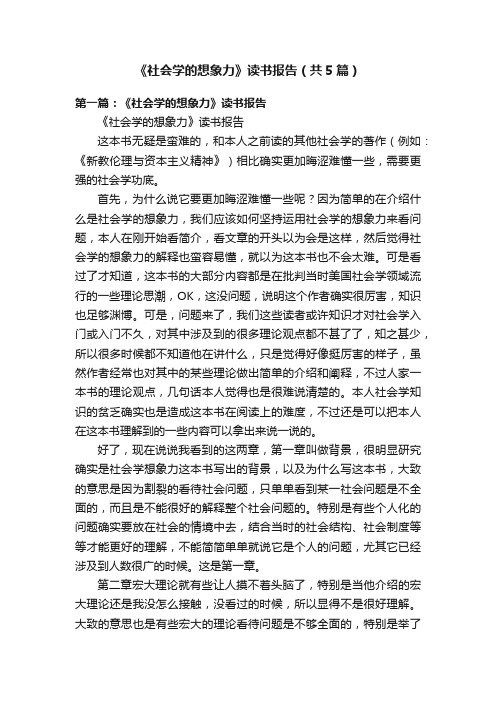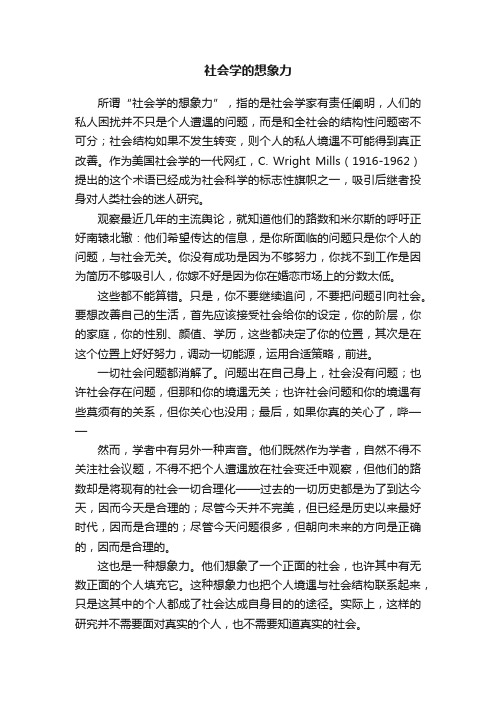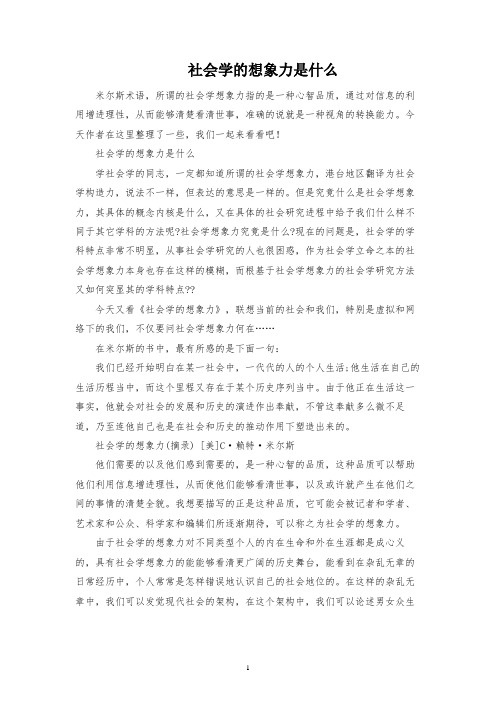社会学的想象力
发挥社会学的想象力

发挥社会学的想象力一何谓社会学的想象力社会学的想象力是米尔斯最先提出的,它是一种研究视角而非研究范式。
米尔斯认为,社会学的想象力“是一种心智品质,这种品质可帮助他们利用信息增进理性,从而使他们能看清世事以及或许就发生在他们之间事情的清晰全貌。
”米尔斯这样定义“社会学想象力”的第一层内涵:“个人只有通过置身于所处的时代中,才能理解他自己的经历并把握自身的命运,他只有变得知晓他身处环境中所有个人的生活机遇,才能明白他自己的生活机遇。
”“社会学想象力”的第二层内涵是社会结构的视角。
上述历史的视角被米尔斯在原文中形容为“环境中的个人困扰”,而这一层内涵被称为“社会结构中的公共论题”。
他把“困扰”界定为私人事务,他感觉到自己珍视的价值受到了威胁。
而“论题”是公共事务,公众感到他们所珍视的某种价值受到威胁,一个论题往往包含了制度安排中的某个危机。
其实困扰是少数人面临的问题,是由个人的原因引起,而论题则是大多数人都会面临的困扰,是由个人以外更宏观的结构等因素导致的。
联盟“社会学想象力”的第三层内涵体现为从一个视角转换到另一个视角的能力,并且,在这个过程中建立起对整个社会及其组成部分的充分认识。
二为什么要在社会研究中米尔斯首先批判的是宏大理论,以帕森斯为代表的结构功能主义,他对《社会系统》一书做了精细的分析,米尔斯多次引用帕森斯的原文,他认为那些枯燥乏味的概念替代了社会学中应有的轻松自由的想象力。
“作为宏大理论家,他们从来没有从更高的一般性回落到他们所处的历史的、结构性情景中存在的问题,由于对真正问题缺乏真实的感受,他们文章的不现实性非常显著。
”由于宏大理论非常注重玩弄概念,喜欢缔造属于自己的“概念王国”,米尔斯甚至认为他们“有时故意规避明白晓畅的行文”。
因为目前的社会学研究中存在上述抑制社会学想象力发挥的因素,作者米尔斯进一步阐述他对于社会学研究的立场,以及他对未来的预设。
三如何在社会研究中第一,要关注人类的多样性。
社会学的想象力

• 断定是否有这种冲突存在,如果它存在,那么分 清事实与价值,是社会科学常常要承担的一个基 本任务。但是,彼此有实际冲突的利益集团会信 奉某些价值,如此坚定,如此始终如一,以至无 法通过逻辑分析和事实调查来解决冲突。那么, 理性在人类事务中扮演的角色似乎也演到尽头。 我们可以澄清价值的含义和结果,可以让它们彼 此一致,并确定它们实际的优先次序,可以用事 实来包容它们——但最后,我们也许会降格到断 言和反断言,于是只能进行申辩或说服,而到最 后,道德问题会变为权利问题,而且,作为最后 一着——权力的终极形式是压制。
• 我们在各种特定的环境中所经历的事情往往是由 结构性的变化引起的,所以,要理解许多个人环 境的变化,我们需要超越这些变化来看待它们。 要想对社会结构的观念有清楚的意识并敏锐地运 用它,就要能在大量不同的环境中捕捉它们彼此 间的联系。 • 这是一个焦虑与淡漠的时代,珍视的价值尚未感 到受到威胁——幸福;被威胁——危机感;不知 何为珍视的价值,也不受威胁——漠然麻木;不 知何为珍视的价值,却明显感觉受到威胁——不 安、焦虑。
• 各分支学科间的相互影响越来越大 。 • “整合社会科学”:要阐明和解决我们这个 时代的任何一个主要问题,都需要从不止 一个学科中选取材料、概念和方法。
前景之二:对历史的运用
• 沙漠玫瑰
• 不同的价值判断 现象本身定在那一个时刻,是孤立的,而 现象背后是一点一滴的线索,是辗转曲折 千丝万缕的来历。 • 鉴往知来 现象在更大的历史的坐标系中所处的位置 是什么?
二、批判之一:宏大理论
• 皇帝的新衣 • 帕森斯是宏大理论的最突出代表 • 繁文冗词、迷恋句法、概念游戏 • AGIL模型
• 不存在什么能让我们理解社会结构的统一性的 “宏大理论”和普遍性的体系,对于古老的颇为 恼人的社会秩序问题,其答案也并非只有一个。 • 宏大理论家们对社会科学的一个主要问题的掌握 是多么欠缺,在《社会系统》一书中,帕森斯并 没能实实在在地从事社会科学研究,因为他已受 如下思想支配,即他所建构的社会秩序模型是某 种放诸四海而皆准的模型,因为他实际上把他的 这些概念奉为神明了。
《社会学的想象力》读书报告(共5篇)

《社会学的想象力》读书报告(共5篇)第一篇:《社会学的想象力》读书报告《社会学的想象力》读书报告这本书无疑是蛮难的,和本人之前读的其他社会学的著作(例如:《新教伦理与资本主义精神》)相比确实更加晦涩难懂一些,需要更强的社会学功底。
首先,为什么说它要更加晦涩难懂一些呢?因为简单的在介绍什么是社会学的想象力,我们应该如何坚持运用社会学的想象力来看问题,本人在刚开始看简介,看文章的开头以为会是这样,然后觉得社会学的想象力的解释也蛮容易懂,就以为这本书也不会太难。
可是看过了才知道,这本书的大部分内容都是在批判当时美国社会学领域流行的一些理论思潮,OK,这没问题,说明这个作者确实很厉害,知识也足够渊博。
可是,问题来了,我们这些读者或许知识才对社会学入门或入门不久,对其中涉及到的很多理论观点都不甚了了,知之甚少,所以很多时候都不知道他在讲什么,只是觉得好像挺厉害的样子,虽然作者经常也对其中的某些理论做出简单的介绍和阐释,不过人家一本书的理论观点,几句话本人觉得也是很难说清楚的。
本人社会学知识的贫乏确实也是造成这本书在阅读上的难度,不过还是可以把本人在这本书理解到的一些内容可以拿出来说一说的。
好了,现在说说我看到的这两章,第一章叫做背景,很明显研究确实是社会学想象力这本书写出的背景,以及为什么写这本书,大致的意思是因为割裂的看待社会问题,只单单看到某一社会问题是不全面的,而且是不能很好的解释整个社会问题的。
特别是有些个人化的问题确实要放在社会的情境中去,结合当时的社会结构、社会制度等等才能更好的理解,不能简简单单就说它是个人的问题,尤其它已经涉及到人数很广的时候。
这是第一章。
第二章宏大理论就有些让人摸不着头脑了,特别是当他介绍的宏大理论还是我没怎么接触,没看过的时候,所以显得不是很好理解。
大致的意思也是有些宏大的理论看待问题是不够全面的,特别是举了一个帕森斯的例子,用很少而且简洁的语言解释了帕森斯的理论,并同时批判了他的理论:当社会均衡存在,以及与之匹配的社会化合控制手段齐全时,怎么还有人不守规矩呢?这是帕森斯没有回答的问题,原因在于他静止的看待问题,无法解释社会变迁,也就是说没有历史观的思维方式?看到这时我个人也是有这个疑惑的,这章大致也就是指出有些宏大理论的这样的问题所在。
肖临骏:社会学的想象力对我国农村社会工作的启示

一、何谓“社会学的想象力”“社会学的想象力”一词最早出自美国社会学家C·莱特·米尔斯的《社会学的想象力》著作中,他认为面对现代性,人们在日常世界中越来越战胜不了自己的困扰,原因是现代人缺乏一种“心智品质”,即社会学的想象力。
对此,米尔斯认为,这种心智品质可以帮助我们利用信息增进理性,能看清世事与我们身边发生的事情的清晰全貌。
在米尔斯看来,社会学的想象力是一种视角转换的能力,能从自己的视角切换到他人的视角,它可以让我们理解历史与个人的生活历程,以及在社会中二者间的联系,这也是米尔斯所谓的社会学的想象力的使命与前景。
米尔斯论述到运用社会学的想象力所作的最优成果是区分了“环境中的个人困扰”与“社会结构中的公众论题”,以失业为例,当一座10万人口的城市只有一个人失业时,问题则出在这个个人的困扰,为了救济他,我们最好要做的则是了解这个人的品行、技能和目前存在的各种机遇。
但如果一个有五千万人雇佣大军的国家,却有一千五百万人失业,这就是个公众论题,此时我们则不能指望从某个个人身上找出解决办法,我们必须考虑社会的经济和政治制度等。
同时,米尔斯还指出,想象力并非社会学该拥有的,他建议政治学家应有“政治学的想象力”,人类学家也应有“人类学的想象力”。
[1]二、近现代我国农村以及农村社会工作的历史与现状社会工作是一个舶来品,农村社会工作是我国结合自身国情所衍生出来的一个新领域,是中国特色的符合中国国情的社会工作,因此,在西方经典的现代专业书籍中,几乎找不到农村社会工作的概念。
下面我将简要论述我国近现代农村发展的历史脉络以及农村社会工作的发展历史,以便我们不管是在农村社会工作的学习还是实践中都能对它有一个清晰的全貌。
(一)近现代我国农村的发展历程第一、20世纪20年代到新中国成立,我国农村实行土地改革,颁布了相关土地法,进行土地制度、土地税收以及土地使用等的改革,这在当时不仅促进了农业生产力的解放,也为后期的工业化道路奠定了基础;第二、新中国成立(或1956年)到1978年改革开放,我国农村实行所谓的“人民公社化”,在全国范围内掀起了以兴修农田水利为高潮的农业生产建设;第三、改革开放到90年代中期,农村实行了“家庭联产承包责任制”,俗称“大包干”,其标志是包产到户(分田到户),这一制度既发挥了集体经济统一经营的优势,又调动了农民的生产积极性,也正是因为政府的支持和这一制度的推广,成就了当时中国的奇迹:用世界7%的土地养活了世界22%的人口;第四、90年代中期到2005年,我国出现了所谓的“三农问题”,即“农民真苦、农村真穷、农民真危险”;第五、2005年10月,在党的十六届五中全会上通过的《十一五规划纲要》中,我国提出了要按照“生产发展、生活宽裕、乡风文明、村容整洁、管理民主”的要求,扎实推进社会主义新农村建设,至此社会主义新农村建设成了我国目前农村发展的新进程,政府当前着力于农村生产的全面发展以提高农民的收入。
社会学的想象力(共5篇)

社会学的想象力(共5篇)第一篇:社会学的想象力关于社会科学的思考——《社会学的想象力》的读书报告邢天璐行政管理三班2010414239《社会学的想象力》堪称米尔斯一生学术精华的大成之作:读完这本书,第一感觉是米尔斯告诉了我们现在社会科学应该如何发展以更好地担任社会科学和社会科学家的使命,作为社会学的学习者或者将来的研究者该具备哪些素质、该注意什么。
因此这本书不是对某一社会问题或现象进行解释的理论专著,而是对学科发展的反思与展望。
米尔斯很犀利地揭露批判了当前社会科学发展的几种研究偏向和社会科学界的腐败现象,强调“社会学想象力”的重大意义。
它以批判美国社会学界的成果作为全书的探讨主题,运用知识社会学的观点,并结合作者在社会阶层等方面的研究经验,批判传统学科的抽象与僵化的界限,由此强调社会学想象力的重大意义。
由此,我们可以看出,米尔斯不是为了写想象力而想象,而是把社会学的想象力放在社会科学这一大背景下思考。
《社会学想象力》是米尔斯针对他所处时代的学术环境和社会环境而提出的“社会学想象力“这一术语。
米尔斯认为:确立社会科学对于我们时代的文化使命具有文化涵义,而这种社会科学的确立恰恰需要社会学的想象力。
那么,社会学的想象力是什么?米尔斯认为:它是一种心智品质,这种品质可帮助我们利用信息增进理性,从而使他们能看清世事,以及或许就发生在我们之间的事情的清晰全貌。
心智是一种视角的转换能力——把个人生活与更广阔的社会整体相联系的能力;把个人命运和社会历史进程相联系的能力。
简而言之,社会学的想象力是整体观和历史感的思维方式。
当然,它不只是当代文化范围内的心智品质之一,对它更广泛更巧妙地应用提供了一个前景:即在其理解力上,事实上,即人类理性本身将在人类事务中发挥更大的作用。
或许运用社会学的想象力所作的最有成果的区分是”环境中的个人困扰”和”社会结构中的公众论题“。
这个区分是社会学想象力的基本工具,也是所有社会科学经典研究的一个特征。
社会学想象力

社会学想象力一、人受困于圈子和历史而不自知1、你的世界跟别人的不一样在圈子时代,人们变得更加孤独和漠然。
普通人骤然面对更加广阔的世界时,会感到无助,无法理解所处时代对自己生活的意义。
出于自我防御,人们会变得只追求私利。
2、什么是社会学的想象力拥有社会学想象力,你不仅能察觉到每个人都处于特定的社会和历史环境中,而且会懂得每天的生活是如何被这样的环境所影响和塑造的。
你要是想理解自己的命运,就必须把自己定位在所处的时代。
要想理解自己的生活,就必须搞清楚所有和自己境遇相同的个体的生活。
3、学社会学想象力有什么用为了更好地做生意,你要具有社会学的想象力;如果想影响这个社会,你更需要具有社会学想象力。
二、该如何看待自杀问题1、自杀是一种个体行为吗如果自杀是因为个人精神上出现了问题,那么这个世界上自杀率最高的地方就应该是精神病医院。
但相关研究数据显示,事实并非如此。
2、社会整合研究数据显示,自杀率不仅仅是个体行为,可能也是一种社会行为。
如果一个社会整合程度越高(社会群体内部的紧密联系程度),这个群体中的个体就会感觉到自己与这个社会的紧密联系,因此,即使陷于逆境也更不容易自杀。
3、失范失范,就是失去规范、陷入迷乱。
这种状态最容易发生在剧烈转型时期。
失范会带来一系列严重的后果,自杀率提高、犯罪率提升、从而导致社会动荡不安。
三、是什么影响了自杀率的高低1、中国的农村妇女自杀率为什么会下降在中国传统的农村社会,妇女的地位更低下,自由选择的机会更少,更难实现“社会整合”。
在过去四十年,农村社会经历了巨大变化,个人需求和社会习俗间的冲突越来越大,导致农村失范,农村妇女尤其深受其害,这才是农村妇女自杀率高的原因。
但随着城市化的发展,妇女发现在城市生活中更容易“社会整合”,所以自杀率下降。
2、为什么士兵的自杀率更高社会整合度与自杀率间的关系不是线性的,而是呈现U型曲线。
因此自杀分为两种:失范性自杀和利他性自杀。
而当士兵因为集体的胜利选择牺牲自我时,这样的自杀就属于社会整合程度过高引起的利他性自杀。
举例说明 社会学想象力

举例说明社会学想象力社会学想象力是指通过想象力去理解和解释社会现象、社会问题以及社会互动的能力。
它是社会学研究的核心能力之一,可以帮助我们深入了解社会的运作机制,发现社会中的规律和变化,并提出合理的解决方案。
以下是关于社会学想象力的十个例子:1. 性别不平等:社会学想象力可以帮助我们理解性别不平等的根源和影响。
通过想象力,我们可以想象一个社会中性别角色不受限制,男女平等的社会,并探索如何实现这种社会。
2. 移民问题:社会学想象力可以帮助我们理解移民问题的复杂性。
通过想象力,我们可以想象自己成为一名移民,面临各种困难和挑战,从而更好地理解移民者的处境和需求。
3. 教育不公平:社会学想象力可以帮助我们理解教育不公平问题的原因和解决方案。
通过想象力,我们可以想象一个公平的教育系统,每个学生都有平等的机会接受优质教育,并探索如何实现这种公平。
4. 贫困与不平等:社会学想象力可以帮助我们理解贫困和不平等问题的根源和影响。
通过想象力,我们可以想象一个没有贫困和不平等的社会,并思考如何改变现有的社会结构和政策来减少贫困和不平等。
5. 社会运动:社会学想象力可以帮助我们理解社会运动的动力和影响。
通过想象力,我们可以想象自己参与一个社会运动,争取一个公正和平等的社会,并思考如何组织和影响他人来实现这个目标。
6. 科技与社会:社会学想象力可以帮助我们理解科技对社会的影响和变革。
通过想象力,我们可以想象未来的科技发展对工作、人际关系和社交方式的影响,并思考如何应对这些影响和变化。
7. 社会网络:社会学想象力可以帮助我们理解社交网络的形成和运作机制。
通过想象力,我们可以想象自己是一个社交网络的一部分,探索网络中的关系和互动,并思考如何利用社交网络来推动社会变革。
8. 媒体与文化:社会学想象力可以帮助我们理解媒体对文化的塑造和传播。
通过想象力,我们可以想象媒体如何影响人们的价值观和行为,并思考如何建立一个多元化和包容性的媒体环境。
浅述《社会学的想象力》

浅述《社会学的想象力》一、什么是社会学想象力《社会学的想象力》(以下简称《想象力》)最早问世于1959年。
米尔斯在当时的体制内是失败的,他一生都没有被转为“正教授”。
但是他的这本书长期以来一直被当作社会学科的经典入门读物,人类学、政治学等邻近学科也往往把它列入本科生的必读书目。
这一方面提高了它的普及率和影响力,然而另一方面却也导致了对它的低度理解。
一个概念的流行往往就是它自身空洞化的开始,在走上神坛成为经典的同时,“想象力”本身却成为一个不被反思和讨论的概念,成为一个什么都可以往里面装的“筐”,米尔斯在使用它时原初的含义和关怀则逐渐被遗忘。
米尔斯在书中说道:“他们需要的以及他们感到需要的,是一种心智的品质,这种品质可帮助他们利用信息增进理性,从而使他们能看清世事,以及或许就发生在他们之间的事情的清晰全貌……可以称之为社会学的想象力。
”个人困扰与被提到公共议题中的社会问题之间存在怎样的联系,社会结构的整体与成分,其结构背后的特定涵义,以及其在横向纵向中的历史地位。
米尔斯认为,这些是具有社会学想象力的人考虑到的问题。
“社会学想象力可以帮助我们理解历史与个人的生活历程,以及在社会中二者的联系,这是社会学的使命与前景。
”可见,米尔斯所说的社会学想象力主要包括两个方面的涵义:一方面是从社会结构的视角来看,社会学想象力是一种可以帮助人们找到个人困扰和社会结构中的公共议题之间的区别和联系的心智能力。
个人困扰是个体在其直接接触的狭小的环境范围内、在与别人的直接联系中遇到的,是私人事务,让个体觉得“他感到自己珍视的价值受到了威胁”,但其实,很多个人困扰其实已经不是个人困扰,“是大多数人都会面临的困扰,是由个人意外的更宏观的结构等因素导致的”。
另一方面是以“历史的视角”,个人要“置身于所处的时代中,才能理解他自己的经理并把握自身的命运,他只有变得知晓他所身处的环境中所有个人的生活际遇,才能明了他自己的生活际遇。
”吉登斯在其《批判的社会学导论》一书中说道,“在我看来,它指的是社会学分析过程中几种联系在一起的不可或缺的感受力。
社会学的想象力

米尔斯的《社会学的想象力》(1).其结构:稳定的社会互动系统——及社会结构——整合的本质,集中于行动者的动机和规范的文化标准间的整合,在我们的人际情境之中,这些文化标准把行动系统整合起来。
读书笔记:摘抄:1.社会学的想象力的第一个成果-一个思想,即个人的只有通过置身于所处的时代之中,才能理解他自己的经历并把握自身的命运,他只有变得知晓他所身处的环境中所有个人的生活机遇,才能明了他自己的生活机遇。
2.要让工人们快乐、高效、乐于合作,我们只需要让管理者们成为聪明、理性和博学的人。
…3.…由于工厂既是工作的地方,也是社会关系形成的地方,所以要定义士气,我们必须考虑客观和主观的尺度。
就角度而言,士气似乎意味着工人们愿意完成手中的工作,完成时心情很不错,甚至非常高兴。
就客观角度而言,则士气似乎意味着工作干得很有效率,大多数的工作是在最短时间内,用最少的钱以最小的困难完成。
所以,在现在的美国工厂,士气一定与工人快乐的服从有关,这种服从引起的结果是,管理者认为,工人在高效从事手中的工作。
4.对我所做的研究进行敏锐的检验。
5.…由于被社会化,他会为他人着想并友善地帮助他们;他不会愁思百结,顾影自怜;相反,他有些外向,踊跃参加社区的日常生活,帮助社区在一个可以调整的有序步伐下“取得进步”。
他加入很多的社区并为之服务。
即便不是十分投入的“参与者”,他当然也会不时的在外面瞅瞅。
他乐于服从传统的道德与动机。
高兴地投身受人尊重的制度的逐渐进步之中。
他的父母可不会离婚,他的家庭也不会无情地破裂。
他可真是“成功”,至少是以谦恭方式取得成功,因为他的进取意识也是很有分寸的;但是,对于过分超越自己能力的事情,他绝不会加以考虑,以免成为一名“脱离实际的思想家”。
作为一名处境尚可的小人物,他不奢求赚到大钱,他的品质太普通,所以我们说不出他们的意义。
…自我理解:进取意识有分寸,但有敢于想象,追求卓越,因为人会在挑战自己的过程中体会到莫大的快乐。
举例说明 社会学想象力

举例说明社会学想象力社会学想象力是指我们能够超越我们自己的个体经验和观点,去理解和想象其他人的经验和观点。
它是社会学研究中非常重要的一个概念,可以帮助我们更好地理解社会现象和人类行为。
下面是一些关于社会学想象力的例子:1. 假设你是一个年轻的大学生,你可以通过社会学想象力来理解一个贫困家庭的生活。
你可以想象他们每天面临的经济困境、缺乏教育资源以及社会排斥的感受。
通过这种想象,你可以更好地理解贫困问题的根源,从而提出解决办法。
2. 假设你是一个男性,你可以通过社会学想象力来理解女性的经历。
你可以想象她们在职场上遇到的性别歧视、家庭责任的压力以及被社会期望束缚的感受。
通过这种想象,你可以更好地理解性别不平等问题,并为打破性别壁垒做出贡献。
3. 假设你是一个白人,你可以通过社会学想象力来理解少数族裔的经历。
你可以想象他们在面对种族歧视、文化冲突以及社会边缘化时的感受。
通过这种想象,你可以更好地理解种族问题,并为推动种族平等做出努力。
4. 假设你是一个精英阶层的人,你可以通过社会学想象力来理解底层人民的生活。
你可以想象他们每天为生计而努力奋斗、面临的社会不公正以及缺乏机会的困境。
通过这种想象,你可以更好地意识到社会阶层问题的存在,并为社会公平做出贡献。
5. 假设你是一个健康的人,你可以通过社会学想象力来理解残疾人的生活。
你可以想象他们在面对身体障碍、社会歧视以及缺乏无障碍设施时的困境。
通过这种想象,你可以更好地关注残疾人的权益,并为建设包容性社会做出贡献。
6. 假设你是一个年轻人,你可以通过社会学想象力来理解老年人的生活。
你可以想象他们在面对身体衰老、社会孤立以及缺乏对老年人的关注时的感受。
通过这种想象,你可以更好地关注老年人的需求,并为建设关爱老年人的社会做出贡献。
7. 假设你是一个城市居民,你可以通过社会学想象力来理解农村人民的生活。
你可以想象他们每天辛勤劳作、面临的农业困境以及城乡差距的感受。
通过这种想象,你可以更好地关注农村发展问题,并为农民的权益争取公平待遇。
社会学的想象力

社会学的想象力所谓“社会学的想象力”,指的是社会学家有责任阐明,人们的私人困扰并不只是个人遭遇的问题,而是和全社会的结构性问题密不可分;社会结构如果不发生转变,则个人的私人境遇不可能得到真正改善。
作为美国社会学的一代网红,C. Wright Mills(1916-1962)提出的这个术语已经成为社会科学的标志性旗帜之一,吸引后继者投身对人类社会的迷人研究。
观察最近几年的主流舆论,就知道他们的路数和米尔斯的呼吁正好南辕北辙:他们希望传达的信息,是你所面临的问题只是你个人的问题,与社会无关。
你没有成功是因为不够努力,你找不到工作是因为简历不够吸引人,你嫁不好是因为你在婚恋市场上的分数太低。
这些都不能算错。
只是,你不要继续追问,不要把问题引向社会。
要想改善自己的生活,首先应该接受社会给你的设定,你的阶层,你的家庭,你的性别、颜值、学历,这些都决定了你的位置,其次是在这个位置上好好努力,调动一切能源,运用合适策略,前进。
一切社会问题都消解了。
问题出在自己身上,社会没有问题;也许社会存在问题,但那和你的境遇无关;也许社会问题和你的境遇有些莫须有的关系,但你关心也没用;最后,如果你真的关心了,哔——然而,学者中有另外一种声音。
他们既然作为学者,自然不得不关注社会议题,不得不把个人遭遇放在社会变迁中观察,但他们的路数却是将现有的社会一切合理化——过去的一切历史都是为了到达今天,因而今天是合理的;尽管今天并不完美,但已经是历史以来最好时代,因而是合理的;尽管今天问题很多,但朝向未来的方向是正确的,因而是合理的。
这也是一种想象力。
他们想象了一个正面的社会,也许其中有无数正面的个人填充它。
这种想象力也把个人境遇与社会结构联系起来,只是这其中的个人都成了社会达成自身目的的途径。
实际上,这样的研究并不需要面对真实的个人,也不需要知道真实的社会。
这样的学者,在历史学当中最明显。
这是因为,历史学天然地带有一点目的论的倾向,历史学家很自然地会想要描述,过去是如何到达现在的,因而也就往往会不自觉地将这个过程形容为自然甚至必然。
社会学的独特视角和社会学的想象力

社会学的独特视角和社会学的想象力
美国著名社会学家米尔斯(Mills)指出,社会学是富有想象力的一门学科。
社会学的想象力使人们能够脱离自己在日常生活中熟悉的那些惯例,并以一种全新的视角来看待那些自己习以为常的东西。
社会学研究的基本特点就集中体现在社会学的想象力中。
我们可以从三个层次来理解社会学想象力的具体含义。
第一,社会学的想象力强调个人生活和社会结构之间的联系。
社会学研究要求人们看到个人生活中的社会结构的力量。
对社会结构的关注,是社会学研究的第一个特点。
第二,社会学的想象力强调人们要用历史的眼光来看待自己的各种境遇。
人们在历史的进程中处于什么位置?历史长河如何把人们推到了目前的境遇之中?只有了解了社会的发展和历史演进,人们才有可能理解自己的个人境遇以及自己今天所处的世界。
对个人生活历程和社会历史的关注,是社会学研究的第二个特点。
第三,社会学想象力还强调对实践的关注。
社会学不仅关注历史,更关注人们的实践行动和实践过程。
对具体实践的关注,是社会学研究的第三个特点。
社会学的想象力每章概括

1.第一章:问题与方法米尔斯阐述了“社会学的想象力”的概念,认为这是
一种理解和解决个人困扰与社会结构之间关系的能力。
他批评了仅关注个体经验而忽视社会结构的研究方法,并倡导将个体生活史与社会历史进程结合起来分析。
2.第二章:社会学透视本章进一步解释了社会学的想象力如何帮助我们看
清个人问题的社会根源,以及社会变迁如何影响个人的生活经历。
米尔斯主张社会学家应该揭示隐藏的社会结构和历史过程对个体命运的影响。
3.第三章:现状的社会学米尔斯批判了当时社会科学研究过于抽象、与现
实脱节的现象,呼吁社会学家关注现实生活中的社会问题,通过社会学的想象力来剖析现代社会的现状。
4.第四章:历史的社会学米尔斯强调了历史维度在社会学研究中的重要
性,认为社会学家应该在历史语境中分析当下社会问题,将个体生活史与宏大社会历史相结合。
5.第五章:权力精英在这一章,米尔斯提出了“权力精英”理论,分析了少
数群体如何通过政治、经济和军事机构掌控社会主导权,影响大众生活。
6.第六章至第十章这几个章节中,米尔斯继续深化对社会学想象力的应
用,探讨了知识分子的角色、社会科学的责任、社会学研究的道德关怀等问题,并对美国社会的阶级结构和权力分配进行了细致的社会学分析。
社会学的想象力米尔斯考研

社会学的想象力米尔斯考研(原创版)目录1.米尔斯的《社会学的想象力》2.社会学的想象力概念3.米尔斯对社会学的贡献4.社会学的想象力在当代的应用5.结语正文一、米尔斯的《社会学的想象力》《社会学的想象力》是美国社会学家 C·赖特·米尔斯的一部代表作。
在这本书中,米尔斯提出了一种名为“社会学的想象力”的心智品质。
这种品质可以帮助人们运用信息发展理性,从而清晰地概括出周边世界正在发生什么,以及他们自己会遭遇到什么。
二、社会学的想象力概念社会学的想象力是一种心智品质,它能让人们超越自己的私人圈子,站在更广阔的社会结构层面上审视自己的生活。
通过这种想象力,人们可以更好地理解自己在社会中的地位,以及自己的行为如何受到社会结构和历史进程的影响。
三、米尔斯对社会学的贡献米尔斯的《社会学的想象力》对社会学学科的发展产生了深远的影响。
他强调了站在更广阔的社会结构层面上审视个人生活的重要性,这使得社会学研究不仅仅是对个体行为的分析,而是深入到对整个社会结构和历史进程的探究。
此外,米尔斯的社会学的想象力概念也为人们理解社会现象提供了一种新的思维方式。
四、社会学的想象力在当代的应用在当代社会,社会学的想象力有着广泛的应用。
它不仅可以帮助人们更好地理解社会现象,还可以用于解决实际问题,如政策制定、社会服务等。
社会学的想象力使得人们能够站在更广阔的视角上审视社会问题,从而提出更有效的解决方案。
五、结语米尔斯的《社会学的想象力》为我们提供了一种独特的视角,帮助我们理解和审视社会现象。
在当代社会,社会学的想象力显得尤为重要,它为我们解决实际问题提供了有力的武器。
《社会学概论》社会学的想像力

1
• 米尔斯在《社会学的想像力》中指出,社
会学的想像力是一种心智的品质,这种品 质可以帮助人们利用信息增处的时代之中,
才能够理解他们自己的经历,并把握自身 的命运,他只有变得知晓他所身处的环境 中所有个人的生活机遇,才能明了他自己 的生活机遇”。
8
• 第五,喝一杯咖啡的行动隐含了某种社会和
经济发展史。与人们熟悉的茶、香蕉、土豆 和白糖一样,咖啡成为一般消费品,也只是 18世纪晚期以后的事。虽然咖啡源于中东, 西方人对咖啡的消费是殖民扩张时期才开始 的,那么西方人到底怎样看待咖啡?过去和 今天的看法有什么不同?咖啡与世界贸易的 发展有着怎样的关系?这也是社会学家感兴 趣的问题。
• 举例来说,早上喝咖啡在许多西方人的日常
生活中标志着一天的开始。在白天,人们常 常是与其他人一起喝咖啡,此时,喝咖啡就 更多地表现为一种社会仪式了。中国人的喝 酒难道不是这样吗?俗话说,酒逢知己千杯 少,说的就是喝酒与社会交往,而这些都为 社会学提供了丰富的研究对象。
5
• 第二,咖啡含有咖啡因,而咖啡因是一种毒品,
6
• 第三,喝一杯咖啡使一个人卷入到了全球一系
列复杂的社会与经济关系中。咖啡生产地大多 数是贫穷国家,而消费地大多数在一些富裕国 家。在国际贸易中,咖啡是仅次于石油的最有 价值的商品,是许多国家最大的外汇来源。咖 啡的生产、加工、运输和销售,为许多人提供 了就业机会,也为国家之间的交往提供了机会。 由于现代社会没有一个社会能够置身于桃花源 中,研究这种全球化的贸易,也是社会学的一 项重要任务。
3
• 因此,具有社会学想像力的人能够看清更广
阔的历史舞台,发现现代社会的构架,通过 这种想像力,个体性的焦虑不安就被体现为 明确的社会性困扰,公众再不漠然,而是参 与到这样的公共论题中。
社会学的想象力

社会学的想象力引言社会学是一门研究人类社会行为、组织和社会结构的学科。
社会学家通过观察、调查和分析社会现象,揭示人类行为背后的社会规律和模式。
而社会学的想象力则是指社会学家在研究社会现象时,通过跳出现实的局限,运用创造性的思维,去构建和探索关于社会的想象和可能性。
本文将探讨社会学的想象力对于推动社会学发展的重要意义,并举例说明其在社会学研究中的应用。
社会学的想象力对于推动社会学发展的重要意义社会学的想象力对于推动社会学发展具有重要意义,主要体现在以下几个方面:1. 拓宽研究视野社会学的想象力可以帮助社会学家拓宽研究视野,超越已有的社会理论和观点,探索新的研究领域和问题。
通过发挥想象力,社会学家可以提出新的研究假设,开展创新的研究方法,从而推动社会学的进一步发展。
2. 解构和重构社会概念社会学的想象力可以帮助社会学家解构和重构社会概念,打破传统观念的束缚。
社会学家通过想象和思考,可以重新解读和理解社会现象和结构,挖掘出背后的隐含规律和机制。
这种解构和重构的过程,促使社会学家对社会问题有更深刻的认识,为社会问题的解决提供新的思路和方法。
3. 提供知识创新社会学的想象力可以激发社会学家进行知识创新。
社会学研究要面对复杂多变的社会现象和问题,传统的研究方法和观点可能无法完全解释和理解这些现象和问题。
借助想象力,社会学家可以提出新的概念和理论,构建新的研究范式,从而推动社会学的知识创新。
4. 增强社会洞察力社会学的想象力可以帮助社会学家增强社会洞察力,更好地理解社会现象和问题。
通过想象和思考,社会学家可以尝试站在不同的视角和立场上观察社会,理解不同社会群体的行为和思维方式。
这种开阔的视野和洞察力,有助于社会学家提出更全面和准确的社会分析和解释。
社会学的想象力在社会学研究中的应用社会学的想象力在社会学研究中有广泛的应用。
以下是几个典型的例子:1. 社会想象力社会学家想象力的应用之一就是社会想象力。
社会想象力是指社会学家通过观察和分析社会现象,超越现实的局限,想象和构建不同的社会模式和结构。
社会学的想象力

社会学的想象力一、引言社会学作为一门研究人类社会行为和组织的学科,涵盖广泛的主题,包括文化、社会结构、权力关系等。
在这一学科中,“想象力”是一个至关重要的概念。
社会学的想象力不仅指研究者对社会现象的观察和分析,更重要的是对社会世界未来发展的猜测和构想。
通过社会学的想象力,我们可以更好地理解和澄清当代社会的诸多现象,同时也有助于我们对未来社会的发展方向进行思考与预测。
二、社会学的历史和发展社会学源远流长,其发展历程与现代社会的起源密切相关。
19世纪初,法国思想家圣西门提出了“社会学”一词,正式确立了这一学科的名目。
随后,社会学在欧洲不断发展壮大,逐渐形成了多元的学派和理论体系。
其中,马克思主义社会学、功能主义社会学、符号互动主义社会学等各具特色,为社会学的想象力提供了丰富的理论基础。
三、社会学的想象力在当代社会的应用在当代社会,社会学的想象力扮演着至关重要的角色。
社会学家通过对社会现象的观察和分析,不仅可以揭示社会现象背后的深层次原因,还可以帮助人们更好地理解和应对当下的社会问题。
比如,在全球化背景下,社会学的想象力可以帮助我们预测未来社会的发展趋势,指导政策制定和社会管理。
四、社会学的想象力对未来社会的启示社会学的想象力不仅能够帮助我们理解当代社会,更能为未来社会的构建提供有益的启示。
通过对当代社会的观察和思考,我们可以预测未来社会可能出现的挑战和机遇,制定相应的发展策略和政策,促进社会的健康发展和进步。
五、结论社会学的想象力是一种重要的认识方式,通过这种方式,我们可以更好地理解和把握社会的变化和发展。
在当代社会,社会学的想象力对于我们认识当下社会、预测未来社会的发展具有重要意义。
因此,我们应该不断地拓展自己的视野,加强对社会现象的观察和分析,以促进社会的和谐与进步。
社会学的想象力是什么

社会学的想象力是什么米尔斯术语,所谓的社会学想象力指的是一种心智品质,通过对信息的利用增进理性,从而能够清楚看清世事,准确的说就是一种视角的转换能力。
今天作者在这里整理了一些,我们一起来看看吧!社会学的想象力是什么学社会学的同志,一定都知道所谓的社会学想象力,港台地区翻译为社会学构造力,说法不一样,但表达的意思是一样的。
但是究竟什么是社会学想象力,其具体的概念内核是什么,又在具体的社会研究进程中给予我们什么样不同于其它学科的方法呢?社会学想象力究竟是什么?现在的问题是,社会学的学科特点非常不明显,从事社会学研究的人也很困惑,作为社会学立命之本的社会学想象力本身也存在这样的模糊,而根基于社会学想象力的社会学研究方法又如何突显其的学科特点??今天又看《社会学的想象力》,联想当前的社会和我们,特别是虚拟和网络下的我们,不仅要问社会学想象力何在……在米尔斯的书中,最有所感的是下面一句:我们已经开始明白在某一社会中,一代代的人的个人生活;他生活在自己的生活历程当中,而这个里程又存在于某个历史序列当中。
由于他正在生活这一事实,他就会对社会的发展和历史的演进作出奉献,不管这奉献多么微不足道,乃至连他自己也是在社会和历史的推动作用下塑造出来的。
社会学的想象力(摘录) [美]C·赖特·米尔斯他们需要的以及他们感到需要的,是一种心智的品质,这种品质可以帮助他们利用信息增进理性,从而使他们能够看清世事,以及或许就产生在他们之间的事情的清楚全貌。
我想要描写的正是这种品质,它可能会被记者和学者、艺术家和公众、科学家和编辑们所逐渐期待,可以称之为社会学的想象力。
由于社会学的想象力对不同类型个人的内在生命和外在生涯都是成心义的,具有社会学想象力的能能够看清更广阔的历史舞台,能看到在杂乱无章的日常经历中,个人常常是怎样错误地认识自己的社会地位的。
在这样的杂乱无章中,我们可以发觉现代社会的架构,在这个架构中,我们可以论述男女众生的种种心理状态。
- 1、下载文档前请自行甄别文档内容的完整性,平台不提供额外的编辑、内容补充、找答案等附加服务。
- 2、"仅部分预览"的文档,不可在线预览部分如存在完整性等问题,可反馈申请退款(可完整预览的文档不适用该条件!)。
- 3、如文档侵犯您的权益,请联系客服反馈,我们会尽快为您处理(人工客服工作时间:9:00-18:30)。
The Sociological ImaginationChapter One: The PromiseC. Wright Mills (1959)Nowadays people often feel that their private lives are a series of traps. They sense that within their everyday worlds, they cannot overcome their troubles, and in this feeling, they are often quite correct. What ordinary people are directly aware of and what they try to do are bounded by the private orbits in which they live; their visions and their powers are limited to the close-up scenes of job, family, neighborhood; in other milieux, they move vicariously and remain spectators. And the more aware they become, however vaguely, of ambitions and of threats which transcend their immediate locales, the more trapped they seem to feel.Underlying this sense of being trapped are seemingly impersonal changes in the very structure of continent-wide societies. The facts of contemporary history are also facts about the success and the failure of individual men and women. When a society is industrialized, a peasant becomes a worker; a feudal lord is liquidated or becomes a businessman. When classes rise or fall, a person is employed or unemployed; when the rate of investment goes up or down, a person takes new heart or goes broke. When wars happen, an insurance salesperson becomes a rocket launcher; a store clerk, a radar operator; a wife or husband lives alone; a child grows up without a parent. Neither the life of an individual nor the history of a society can be understood without understanding both.Yet people do not usually define the troubles they endure in terms of historical change and institutional contradiction. The well-being they enjoy, they do not usually impute to the big ups and downs of the societies in which they live. Seldom aware of the intricate connection between the patterns of their own lives and the course of world history, ordinary people do not usually know what this connection means for the kinds of people they are becoming and for the kinds of history-making in which they might take part. They do not possess the quality of mind essentialto grasp the interplay of individuals and society, of biography and history, of self and world. They cannot cope with their personal troubles in such ways as to control the structural transformations that usually lie behind them.Surely it is no wonder. In what period have so many people been so totally exposed at so fast a pace to such earthquakes of change? That Americans have not known such catastrophic changes as have the men and women of other societies is due to historical facts that are now quickly becoming 'merely history.' The history that now affects every individual is world history. Within this scene and this period, in the course of a single generation, one sixth of humankind is transformed from all that is feudal and backward into all that is modern, advanced, and fearful. Political colonies are freed; new and less visible forms of imperialism installed. Revolutions occur; people feel the intimate grip of new kinds of authority. Totalitarian societies rise, and are smashed to bits - or succeed fabulously. After two centuries of ascendancy, capitalism is shownup as only one way to make society into an industrial apparatus. After two centuries of hope, even formal democracy is restricted to a quite small portion of mankind. Everywhere in the underdeveloped world, ancient ways of life are broken up and vague expectations become urgent demands. Everywhere in the overdeveloped world, the means of authority and of violence become total in scope and bureaucratic in form. Humanity itself now lies before us, the super-nation at either pole concentrating its most coordinated and massive efforts upon the preparationof World War Three.The very shaping of history now outpaces the ability of people to orient themselves in accordance with cherished values. And which values? Even when they do not panic, people often sense that older ways of feeling and thinking have collapsed and that newer beginnings are ambiguous to the point of moral stasis. Is it any wonder that ordinary people feel they cannot cope with the larger worlds with which they are so suddenly confronted? That they cannot understand the meaning of their epoch for their own lives? That - in defense of selfhood - they become morally insensible, trying to remain altogether private individuals? Is it any wonder that they come to be possessed by a sense of the trap?It is not only information that they need - in this Age of Fact, information often dominates their attention and overwhelms their capacities to assimilate it. It is not only the skills of reason that they need - although their struggles to acquire these often exhaust their limited moral energy. What they need, and what they feel they need, is a quality of mind that will help them to use information and to develop reason in order to achieve lucid summations of what is going on in the world and of what may be happening within themselves. It is this quality, I am going to contend, that journalists and scholars, artists and publics, scientists and editors are coming to expect of what may be called the sociological imagination.The sociological imagination enables its possessor to understand the larger historical scene in terms of its meaning for the inner life and the external career of a variety of individuals. It enables him to take into account how individuals, in the welter of their daily experience, often become falsely conscious of their social positions. Within that welter, the framework of modern society is sought, and within that framework the psychologies of a variety of men and women are formulated. By such means the personal uneasiness of individuals is focused upon explicit troubles and the indifference of publics is transformed into involvement with public issues.The first fruit of this imagination - and the first lesson of the social science that embodies it - is the idea that the individual can understand her own experience and gauge her own fate only by locating herself within her period, that she can know her own chances in life only by becoming aware of those of all individuals in her circumstances. In many ways it is a terrible lesson; in many ways a magnificent one. We do not know the limits of humans capacities for supremeeffort or willing degradation, for agony or glee, for pleasurable brutality or the sweetness of reason. But in our time we have come to know that the limits of 'human nature' are frighteningly broad. We have come to know that every individual lives, from one generation to the next, in some society; that he lives out a biography, and lives it out within some historical sequence. By the fact of this living, he contributes, however minutely, to the shaping of this society and to the course of its history, even as he is made by society and by its historical push and shove.The sociological imagination enables us to grasp history and biography and the relations between the two within society. That is its task and its promise. To recognize this task and this promise is the mark of the classic social analyst. It is characteristic of Herbert Spencer - turgid, polysyllabic, comprehensive; of E. A. Ross - graceful, muckraking, upright; of Auguste Comte and Emile Durkheim; of the intricate and subtle Karl Mannheim. It is the quality of all that is intellectually excellent in Karl Marx; it is the clue to Thorstein Veblen's brilliant and ironic insight, to Joseph Schumpeter's many-sided constructions of reality; it is the basis of the psychological sweep of W. E. H. Lecky no less than of the profundity and clarity of Max Weber. And it is the signal of what is best in contemporary studies of people and society.No social study that does not come back to the problems of biography, of history and of their intersections within a society has completed its intellectual journey. Whatever the specific problems of the classic social analysts, however limited or however broad the features of social reality they have examined, those who have been imaginatively aware of the promise of their work have consistently asked three sorts of questions:(1) What is the structure of this particular society as a whole? What are its essential components, and how are they related to one another? How does it differ from other varieties of social order? Within it, what is the meaning of any particular feature for its continuance and for its change? (2) Where does this society stand in human history? What are the mechanics by which it is changing? What is its place within and its meaning for the development of humanity as a whole? How does any particular feature we are examining affect, and how is it affected by, the historical period in which it moves? And this period - what are its essential features? How does it differ from other periods? What are its characteristic ways of history-making?(3) What varieties of men and women now prevail in this society and in this period? And what varieties are coming to prevail? In what ways are they selected and formed, liberated and repressed, made sensitive and blunted? What kinds of `human nature' are revealed in the conduct and character we observe in this society in this period? And what is the meaning for 'human nature' of each and every feature of the society we are examining?Whether the point of interest is a great power state or a minor literary mood, a family, a prison, a creed - these are the kinds of questions the best social analysts have asked. They are the intellectual pivots of classic studies of individuals in society - and they are the questions inevitably raised by any mind possessing the sociological imagination. For that imagination isthe capacity to shift from one perspective to another - from the political to the psychological; from examination of a single family to comparative assessment of the national budgets of the world; from the theological school to the military establishment; from considerations of an oil industry to studies of contemporary poetry. It is the capacity to range from the most impersonal and remote transformations to the most intimate features of the human self - and to see the relations between the two. Back of its use there is always the urge to know the social and historical meaning of the individual in the society and in the period in which she has her quality and her being.That, in brief, is why it is by means of the sociological imagination that men and women now hope to grasp what is going on in the world, and to understand what is happening in themselves as minute points of the intersections of biography and history within society. In large part, contemporary humanity's self-conscious view of itself as at least an outsider, if not a permanent stranger, rests upon an absorbed realization of social relativity and of the transformative power of history. The sociological imagination is the most fruitful form of this self-consciousness. Byits use people whose mentalities have swept only a series of limited orbits often come to feel as if suddenly awakened in a house with which they had only supposed themselves to be familiar. Correctly or incorrectly, they often come to feel that they can now provide themselves with adequate summations, cohesive assessments, comprehensive orientations. Older decisions that once appeared sound now seem to them products of a mind unaccountably dense. Their capacity for astonishment is made lively again. They acquire a new way of thinking, they experience a transvaluation of values: in a word, by their reflection and by their sensibility, they realize the cultural meaning of the social sciences.Perhaps the most fruitful distinction with which the sociological imagination works is between 'the personal troubles of milieu' and 'the public issues of social structure.' This distinction is an essential tool of the sociological imagination and a feature of all classic work in social science. Troubles occur within the character of the individual and within the range of his or her immediate relations with others; they have to do with one's self and with those limited areas of social life of which one is directly and personally aware. Accordingly, the statement and the resolution of troubles properly lie within the individual as a biographical entity and within the scope of one's immediate milieu - the social setting that is directly open to her personal experience and to some extent her willful activity. A trouble is a private matter: values cherished by an individual are felt by her to be threatened.Issues have to do with matters that transcend these local environments of the individual and the range of her inner life. They have to do with the organization of many such milieu into the institutions of an historical society as a whole, with the ways in which various milieux overlap and interpenetrate to form the larger structure of social and historical life. An issue is a public matter: some value cherished by publics is felt to be threatened. Often there is a debate about what that value really is and about what it is that really threatens it. This debate is often without focus if only because it is the very nature of an issue, unlike even widespread trouble, that it cannot very well be defined in terms of the immediate and everyday environments of ordinary people. An issue, in fact, often involves a crisis in institutional arrangements, and often too it involves what Marxists call 'contradictions' or 'antagonisms.'In these terms, consider unemployment. When, in a city of 100,000, only one is unemployed, that is his personal trouble, and for its relief we properly look to the character of the individual, his skills and his immediate opportunities. But when in a nation of 50 million employees, 15 million people are unemployed, that is an issue, and we may not hope to find its solution within the range of opportunities open to any one individual. The very structure of opportunities has collapsed. Both the correct statement of the problem and the range of possible solutions require us to consider the economic and political institutions of the society, and not merely the personal situation and character of a scatter of individuals.Consider war. The personal problem of war, when it occurs, may be how to survive it or how to die in it with honor; how to make money out of it; how to climb into the higher safety of the military apparatus; or how to contribute to the war's termination. In short, according to one's values, to find a set of milieux and within it to survive the war or make one's death in it meaningful. But the structural issues of war have to do with its causes; with what types of people it throws up into command; with its effects upon economic and political, family and religious institutions, with the unorganized irresponsibility of a world of nation-states.Consider marriage. Inside a marriage a man and a woman may experience personal troubles, but when the divorce rate during the first four years of marriage is 250 out of every 1,000 attempts, this is an indication of a structural issue having to do with the institutions of marriage and the family and other institutions that bear upon them.Or consider the metropolis - the horrible, beautiful, ugly, magnificent sprawl of the great city. For many members of the upperclass the personal solution to 'the problem of the city' is to have an apartment with private garage under it in the heart of the city and forty miles out, a house by Henry Hill, garden by Garrett Eckbo, on a hundred acres of private land. In these two controlled environments - with a small staff at each end and a private helicopter connection - most peoplecould solve many of the problems of personal milieux caused by the facts of the city. But all this, however splendid, does not solve the public issues that the structural fact of the city poses. What should be done with this wonderful monstrosity? Break it all up into scattered units, combining residence and work? Refurbish it as it stands? Or, after evacuation, dynamite it and build new cities according to new plans in new places? What should those plans be? And who is to decide and to accomplish whatever choice is made? These are structural issues; to confront them and to solve them requires us to consider political and economic issues that affect innumerable milieux. In so far as an economy is so arranged that slumps occur, the problem of unemployment becomes incapable of personal solution. In so far as war is inherent in the nation-state system and in the uneven industrialization of the world, the ordinary individual in her restricted milieu will be powerless - with or without psychiatric aid - to solve the troubles this system or lack of system imposes upon him. In so far as the family as an institution turns women into darling little slaves and men into their chief providers and unweaned dependents, the problem of a satisfactory marriage remains incapable of purely private solution. In so far as the overdeveloped megalopolis and the overdeveloped automobile are built-in features of the overdeveloped society, the issues of urban living will not be solved by personal ingenuity and private wealth. What we experience in various and specific milieux, I have noted, is often caused by structural changes. Accordingly, to understand the changes of many personal milieux we are required to look beyond them. And the number and variety of such structural changes increase as the institutions within which we live become more embracing and more intricately connected with one another. To be aware of the idea of social structure and to use it with sensibility is to be capable of tracing such linkages among a great variety of milieux. To be able to do that is to。
